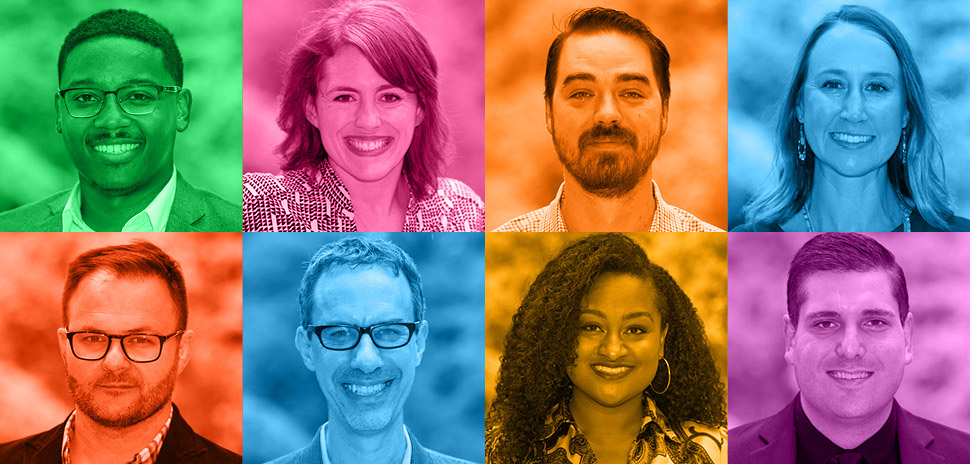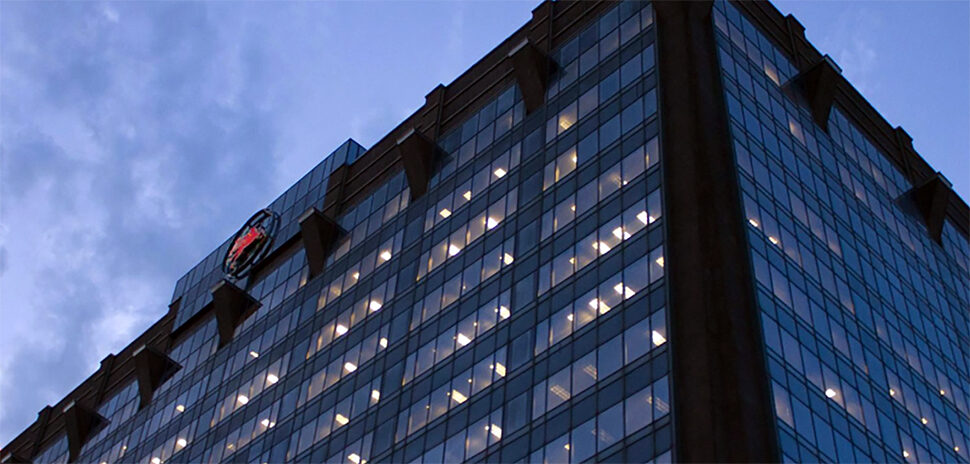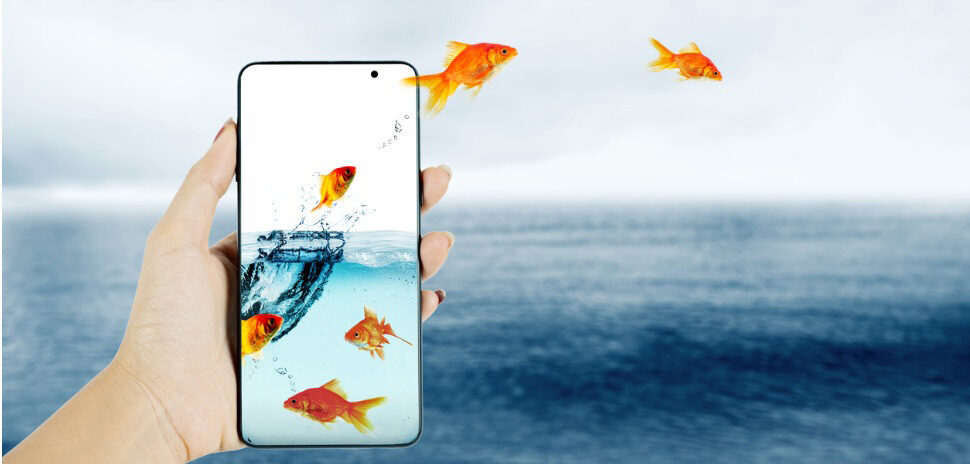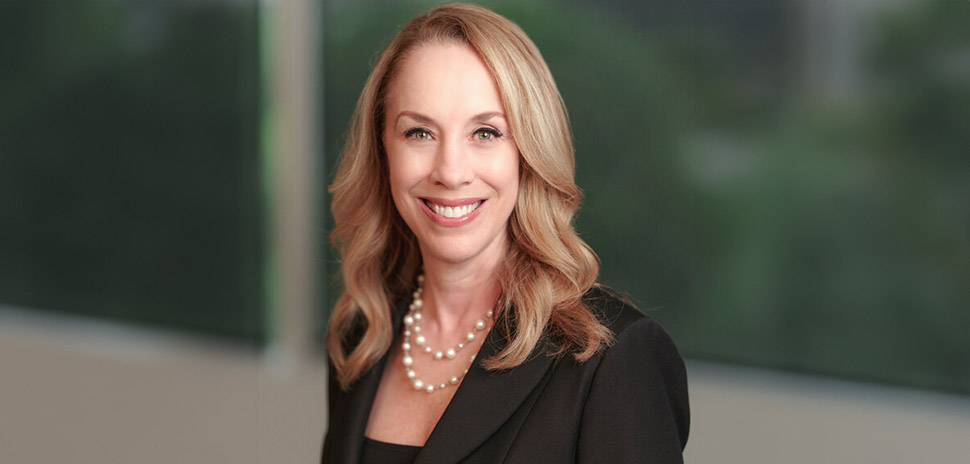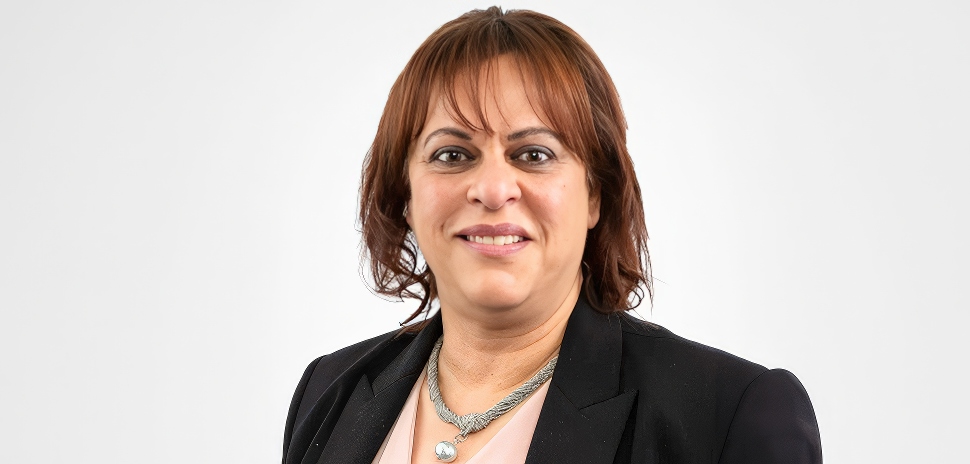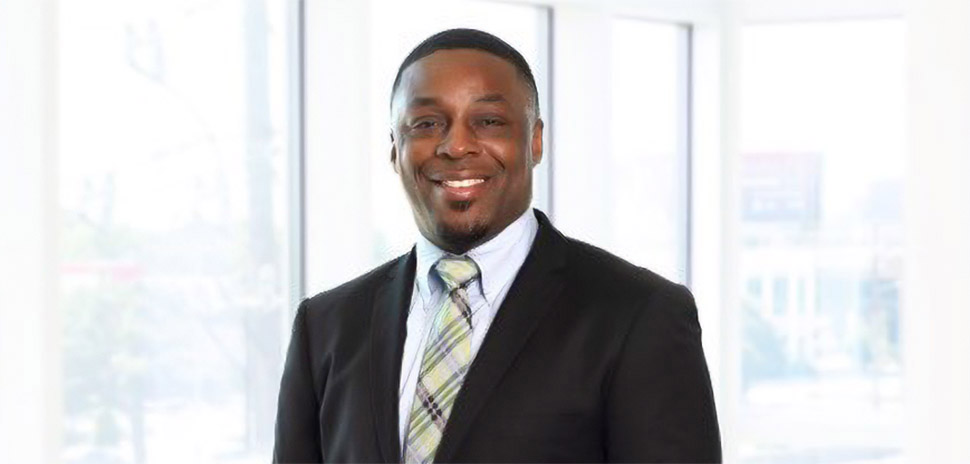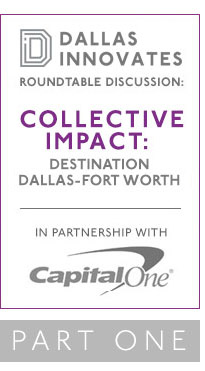 The Dallas Innovates Collective Impact roundtable brings together a variety of perspectives — from nonprofits to corporations to startups — to discuss the state of social innovation in the North Texas region and beyond.
The Dallas Innovates Collective Impact roundtable brings together a variety of perspectives — from nonprofits to corporations to startups — to discuss the state of social innovation in the North Texas region and beyond.
This wide-ranging discussion, moderated by Salah Boukadoum, explores the attraction of Dallas as a regional hub for impact, analyzes the role of businesses and nonprofits, asks how we can do more, better — and ends with predictions of where things are heading. Boukadoum, as a social entrepreneur and founder, is uniquely positioned to lead the discussion, as well as participate.
In the first of our three-part series, you’ll find a scope for the various perspectives sitting around our table. Each expert looks at our core theme—social innovation—from their specific industry’s view. You’ll meet the panel, understand what they do, and why they do it.
In parts two and three, the panel talks impact in DFW, what makes the region a unique breeding ground for social change, how we can improve, and more.
Meet the Experts
M O D E R A T O R
 SALAH BOUKADOUM
SALAH BOUKADOUM
Founder, Impact City Initiative; Co-founder, Good Returns Network; CEO, Soap Hope
Boukadoum is a social entrepreneur creating a wide scope of change across the Dallas-Fort Worth region. Boukadoum has created and leads numerous companies across North Texas, including social ventures, nonprofits, and impact organizations. His commentary piece, Dallas: The Impact City, published on Dallas Innovates in our inaugural year, is our most-read Voices article — ever. “My passion is social and economic innovation to empower all 7.5 billion of us,” Boukadoum says.
T H E P A N E L
 KATE KNIGHT
KATE KNIGHT
Director of Innovation, GroundFloor Project, United Way of Metropolitan Dallas
In Knight’s role, she oversees the GroundFloor program, United Way’s social innovation accelerator program that looks for solutions to social problems in the community around occupation, ability, and health. It provides support in terms of funding, mentoring, access to resources, and connections, to make that impact better, faster, and stronger. “I’m pleased to be sitting at this table with a couple of our fellows,” she says. “It’s good company.”
 MATT MYERS
MATT MYERS
Founder E-Capital Summit; Vice President, EarthX
EarthX is known as the ‘largest environmental experience’ as an international nonprofit showcasing the latest initiatives, discoveries, research, innovations, policies, and corporate practices reshaping the future. Myers is also the co-founder and executive director of the EarthX E-Capital summit (in Dallas April 25-28, 2019), which he calls “a tech investment summit focused on families and foundations.”
 MICHAEL THOMAS
MICHAEL THOMAS
Executive Director, My Possibilities
My Possibilities is a higher education and continued learning program for adults who have special needs. It also provides job placement, job support, and various services for individuals interested in entering the workforce. “Fun fact: Before the nonprofit, there was a thought that I wanted to be a classical pianist,” Thomas says. “I realized there were dudes like him [motioning to Moderator Salah Boukadoum, a former international concert pianist] who were out there, and that was a terrible career path.”
 BENJAMIN VANN
BENJAMIN VANN
Founder and CEO, Impact House
Impact House is a nonprofit business incubator and venture accelerator that connects, supports, and grows diverse entrepreneurs addressing industry inequities and disparities. Not only does it address the racial wage gap, but also provides the underrepresented access to coaching, curriculum, capital, and culture. “We ‘accelerate the best’ in all shades of genius,” Vann says.
 SARA VASSAR
SARA VASSAR
Senior Director, Digital Product Management, Capital One
Vassar is from the Capital One Garage, the company’s innovation lab in Dallas-Fort Worth. Her team is responsible for “building out the innovation muscle” at Capital One’s Plano office. “The team facilitates bringing products to market,” Vassar says, “and we are helping to do that better, faster, and cheaper.”
 STEVE WANTA
STEVE WANTA
Co-founder and CEO, Just
Just invests in low-income female entrepreneurs by providing capital and small loans, alongside coaching, to create more visibility in the community. “Our higher purpose is to create a more just world,” Wanta says, “Less stress, and more joy.” Just is based in Austin, but Wanta says because of United Way GroundFloor, they’ve chosen Dallas as the next destination to expand as part of a long-term vision to change the narrative.
 MICHELLE WILLIAMS
MICHELLE WILLIAMS
Executive Director, Southern Region, The Dallas Entrepreneur Center
A nonprofit organization driving innovation and economic impact, the Dallas Entrepreneur Center (DEC) is dedicated to helping entrepreneurs start, build, and grow their businesses. “I’m overseeing the launch of three locations in Oak Cliff, specifically one at Red Bird Mall, which I’m so excited about,” she says. True to her collaborative spirit, she adds, “There’s also Paul Quinn College and UNT Dallas to encourage entrepreneurship in higher education.”
Defining social innovation
SALAH BOUKADOUM: Matt, let’s start with you. You’ve got a huge macro-level view of social innovation at EarthX. How do you define social innovation from your viewpoint?
MATT MYERS: Outside of here, it’s impact — it’s anything that’s going to help have a more positive impact on people and the planet. That’s very broad, but, to me, that’s what it means.
Matt works with big blocks of infrastructure and dollars. Steve, from your perspective of working with the individual entrepreneur, what is social innovation for you?
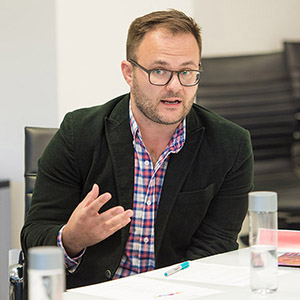
Steve Wanta
STEVE WANTA: I think the origin for modern social innovation is global finance. I was fortunate to be at the presentation of the Congressional Gold Medal to Dr. Muhammad Yunus [awarded for his contributions to the fight against global poverty]. He told the story about how he got into it, which is what I’m so excited by. In 1976, Dr. Yunus was teaching in Bangladesh and saw people dying of famine. He asked, “how do I help one person?” That’s all he cared about — creating something to help one person. And that one person could be hundreds of thousands or millions. I think the responsibility of true innovators is to think of it as a system. The problems society is facing are all too often systemic problems.
Kate, you also have a very specific definition.
KATE KNIGHT: Yes. When United Way started GroundFloor, [we had to define] pretty early on what we were going to consider social innovation. We looked to leaders in the U.S., such as the Stanford Social Innovation Review. Their definition is the one we’ve adopted. It basically says social innovation is a “novel solution to a social problem that’s more efficient, effective, sustainable, or just than current solutions.” So that’s what we use. That’s what we challenge our volunteers to evaluate against and our innovators to frame their applications by.
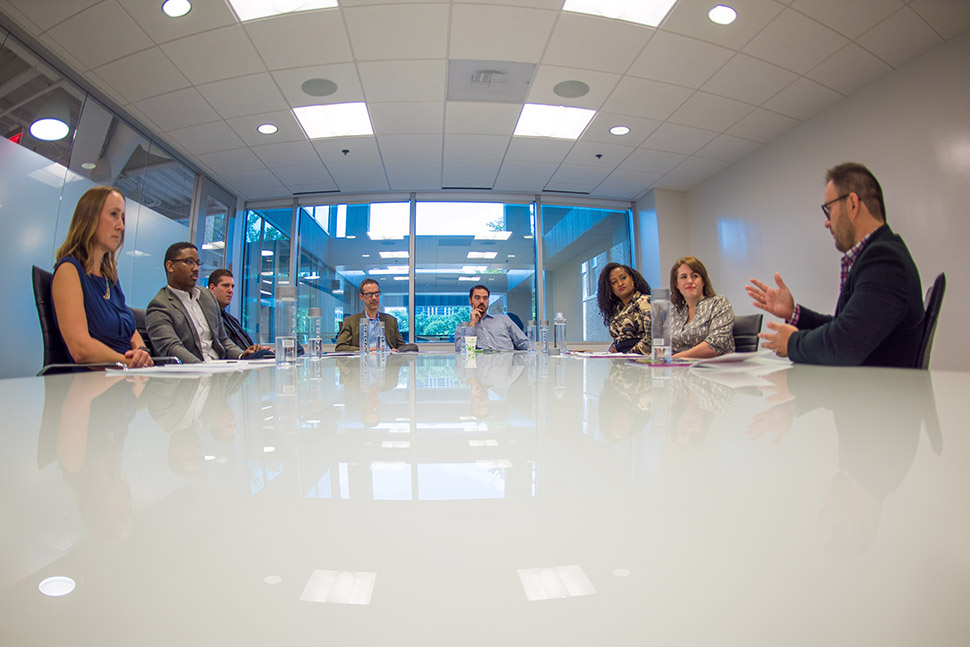
With the panel’s perspective of visiting and coaching different kinds of social innovators, what do you think are some top organizations and approaches to social innovation that you see happening right now?
KNIGHT: At this table, we’ve got Just here — Steve [Wanta]. And, My Possibilities — Michael [Thomas] and the work they are doing. They will get to talk about their work, and I have such admiration for what they’re doing. The sheer volume of folks working in this space has exploded in the five years since GroundFloor has been in existence. From 2015 to 2017, the number of application has probably doubled. And we find ourselves in a harder position: How do we narrow it? [This year] we didn’t stick to our number, our 10. We figured out a way to take on 11 organizations.
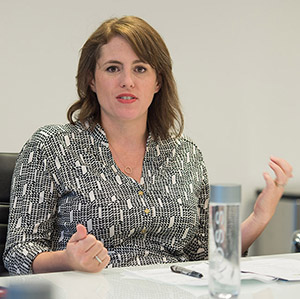
Kate Knight
We’ve seen a diverse set of organizations, from Adaptive Training Foundations — working with injured veterans, folks that are paralyzed, and finding a very physical approach to healing the mind — to Bonton Farms that are taking a grassroots approach to feeding a community — and healing that community by restoring a neighborhood feel through healthy food.
This year, of our 11 organizations, two of them are already at this table. With My Possibilities, we’re looking at a revolutionary business model and Just, scaling into Dallas to support small entrepreneurs. We’ve also got Yoga N Da Hood, a business that [uses] mindfulness in schools to teach self-regulation. Mindfulness uses a practice that’s very “en vogue” right now, but isn’t always accessible to a lot of communities, to teach school kids with toxic stress in their life how to regulate their emotions on a day-to-day basis. By teaching tools that many people take for granted, these kids can learn to control and deal with their emotions. They will stay in the classroom and learn. Then, there’s Student Success Agency, that connects high school kids with near-age mentors who can help them persevere and find their path after high school. It’s hard not to talk about all of it: The [innovators] are wide-ranging, really incredible people tackling difficult issues.
MYERS: Why do you think that applications have doubled?
KNIGHT: I think it’s two-fold. One is something that we’ve done to elevate the visibility. It’s a natural thing as you grow from an early program into something that’s more robust. People know about you and that’s kind of — you hope — inevitable.
The other thing I’ve seen is about the way people think of themselves in the community. I’ve met with a lot of entrepreneurs — people with ideas who have a passion for helping people. A lot of the folks I met with five years ago may have had an idea, but they didn’t think of themselves as an entrepreneur or as an innovator. Now, it’s a confluence of a lot of different things. You hear people talk about innovation. You have other [resources] in the community. You have Dallas Innovates spreading the word. So, I think people are thinking about it differently.
“A lot of the folks I met with five years ago may have had an idea, but they didn’t think of themselves as an entrepreneur or as an innovator. Now, it’s a confluence of a lot of different things. You hear people talk about innovation. You have other [resources] in the community. You have Dallas Innovates spreading the word. So, I think people are thinking about it differently.”
KATE KNIGHT
Michelle, you look first from a nonprofit/social lens and then bring in the entrepreneurship. From your perspective — focusing on the entrepreneurial first — what are you seeing for social innovation?
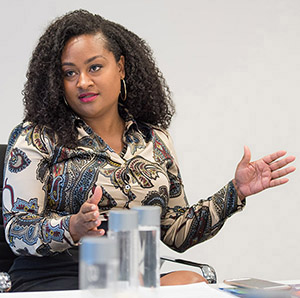
Michelle Williams
MICHELLE WILLIAMS: My background is really in equity. So working from that perspective is more [grounded] in economic development than the rest. I think that gives me a unique perspective when I’m working with new entrepreneurs who are coming in. I’m able to see the way programming has been structured, the way that we have allocated resources, and if there are gaps that have been left out. I’m really excited to launch the program that we’re doing in Oak Cliff, and uplifting some of the ideas that are coming from the community. Talking about the definition of social innovation, there’s a piece of where culture and community and solutions collide. It’s not just me going in and saying, “Hey, I have a great idea of how the fix this.” It’s asking you, and saying, “Hey, in your community, what are the issues, and how would you solve that?” Okay, “well, let me empower you to solve that.”
KNIGHT: Amen.
“Talking about the definition of social innovation, there’s a piece of where culture and community and solutions collide. It’s not just me going in and saying, ‘Hey, I have a great idea of how the fix this.’ It’s asking you, and saying, ‘Hey, in your community, what are the issues, and how would you solve that?‘”
MICHELLE WILLIAMS
WILLIAMS: The best part of it is we get to help people’s dreams come true. We have entrepreneurs who are truly passionate about their business idea — about what they want to see in their community. Often because there’s a gap that exists, they want to solve for that gap. So it’s a little bit of both. We need to teach you basic business acumen so that your business can be successful, but it’s also about what I can do to help you get that [amazing idea] off the ground.
BOUKADOUM: Michael, let’s hear from your perspective. You’re also working on the ground. Tell us a little bit about that and, specifically, how partnerships are impacting the way that you look at your work in the community.
MICHAEL THOMAS: We’ve spent a great deal of time making sure that people engage the organization not [only] when they come to us. We have to be out and active within the community. What we’ve started working on is finding ways to leverage community partnerships to improve some of the lack of funding issues or lack of systems issues that we face. So there’s where there’s an incredibly segmented world, where you’ve got different organizations and funders and investors talking to each other who are supposed to [help] the same person.
We’ve kind of stepped out of the bounds of how it always works, and we’re bringing in people [from companies like] Capital One, AT&T, and Toyota to help us pull away from the way we’ve been told to do things. We asked for feedback on how best the Capital Ones and the AT&Ts of the world [may] benefit from what we’re doing. Starting from there, we’re working backwards: What does it take to fund this program? To some degree, [it’s] almost privatizing job placement services for a population that has always been forced to go down the same path and the same waiting list[s]. So, it’s about identifying what our community and corporate partners are interested in — the same way any two businesses get together and have a conversation about how we help each other. We have the same conversation, but it’s from a nonprofit angle. We don’t care whether funding comes from the state or a Community Service Representatives budget or a philanthropic budget or marketing budget. It doesn’t matter. It’s about how we can utilize the funds the corporate world has access to, to change our system.
“What we’ve started working on is finding ways to leverage community partnerships to improve some of the lack of funding issues or lack of systems issues that we face. So there’s where there’s an incredibly segmented world, where you’ve got different organizations and funders and investors talking to each other who are supposed to [help] the same person.”
MICHAEL THOMAS
BOUKADOUM: There’s a dichotomy that I thought about while looking at this segment. Ben, you work from the perspective of the tiniest of tiniest —you’ve got your “impact first” with the business as a requirement—and Sara, you work from the perspective of a very large corporation—with a focus on things through a business lens. Tell us a little bit about how the social innovation world is from those perspectives.
BEN VANN: To piggyback off what Michael said about partnerships and corporations: In my experience, what I found is that in the corporate world, they really struggle with finding the partners and where to place their impact. They also have a struggle of understanding that there’s more power in the corporations — not just capital. The most valuable asset that corporations have is people. How can we unlock the human capital — the skills, the talents, the degrees — that are locked up in our corporate walls? How can we partner with those people on the ground who are, literally, at the starting point? And there’s an education gap as well. We use design thinking as a fundamental principal of how we approach the work. It’s really designing the program around the entrepreneur and what they need — but also the end user. In the tech world, they ask, “who’s your customer?” and “who’s your target audience?” A design thinking process using that in a hexagon form allows you to do that with centering the issues and then centering the people who are being impacted.
“The most valuable asset that corporations have is people. How can we unlock the human capital — the skills, the talents, the degrees — that are locked up in our corporate walls? How can we partner with those people on the ground who are, literally, at the starting point?”
BENJAMIN VANN
We also looked at a way to say the “changemaker system” is kind of broken, right? We get in our “silo” in a boardroom, and we decide we’re going to be masters of change. We decide what goes on. We’ve opened up the accelerator model with the tiniest corporations at the bottom, and asked how we can get all the players, the stakeholders, the community members to really flip the model — come from a bottom-up approach versus designing the issues from the top down. But how do we interview the community members to find out what’s going on? And how do entrepreneurs listen to that and shape their problems around those challenges?
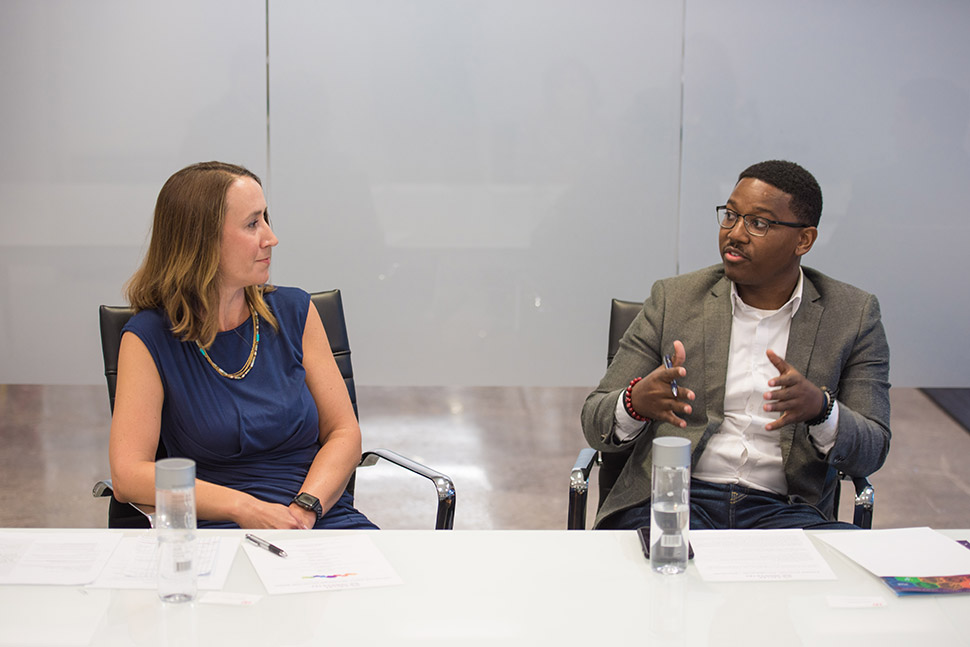
Sara Vassar and Benjamin Vann [Photo: Michael Samples]
SARA VASSAR: Giving back is in Capital One’s DNA. It’s important to us as a company and our associates to give back to the community — our community. We’re one of the largest employers in the region and have a responsibility, not only to the community, but to our employees and to our customers who live here as well.
Capital One launched the Future Edge initiative in 2015 and pledged 150 million dollars over five years to help Americans with the skills, tools, and resources they need to be successful in an ever-changing, digitally driven economy. We bring that to life through strong partnerships with nonprofits and educators that have like-minded goals with us. Those include mentorship programs at the Dallas Entrepreneur Center, tech training with NPower for adults, and coding camps for kids in the summer, to name a few.
“Giving back is in Capital One’s DNA. It’s important to us as a company and our associates to give back to the community — our community. We’re one of the largest employers in the region and have a responsibility, not only to the community, but to our employees and to our customers who live here as well.”
SARA VASSAR
VANN: We were a huge partner in the Future Edge initiative and had one kid get an internship offered on the spot by going through the program. And the other thing I’ll say is, it’s interesting that corporations when they come to Community Service Representatives (CSR) they are starting to really know how to focus on a niche — things that they are doing great at. I just had an opportunity to visit Toyota before coming here, and their focus is on project management, and it’s interesting to see. Fidelity has a financial literacy client with their CSR. So they are starting to really define what their CSR looks like, versus saying “Hey, let’s go out and plant trees.” Every company can do that. We do need trees — but how can we actually define the true value of you, our corporation, and how we implement that? So, it’s not about coming in one time. You teach them to actually implement and grow. Maybe they will teach it to someone else and so that impact grows.
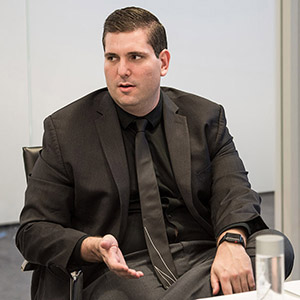
Matt Myers
MYERS: Something that came to my mind when you were talking is that I’ve been in talks with Intuit about sustainability. They want to have impact beyond [their] four walls. Intuit has done a lot in terms of using renewables for their servers … They can say they are sustainable environmentally, but they want to do a lot more, [and we’re] looking at Intuit’s reach with their customer base and how to leverage that. We’re going to partner with them on utilizing some of the excess energy they have from a wind farm and selling that. We’ll be promoting this pure Texas wind energy to consumers in Texas that’s at a competitive price point with brown energy — the coal and [others]. Corporations are starting to think that way.
Another thing I’m talking to them about is getting in-kind services and mentorship to deploy to entrepreneurs globally. QuickBooks is really difficult to use. So, how do we get people to mentor entrepreneurs who don’t have time to learn QuickBooks and accelerate their development? That’s coming, most interestingly, from the boards because shareholders now are demanding that corporations pay more attention. And I have my environmental lens on what they’re doing with the environment and with climate change.
“How do we get people to mentor entrepreneurs who don’t have time to learn QuickBooks and accelerate their development? That’s coming, most interestingly, from the boards because shareholders now are demanding that corporations pay more attention.”
MATT MYERS
KNIGHT: And the workforce is demanding it. As the workforce turns over and the younger generations come in, there’s a demand for a commitment to the community. We see at United Way a ton of interest around that sort of skills-based volunteering. … [And to your point about QuickBooks], we spent a lot of time looking to our fellows and our alumni for these kinds of things — literally this week it was like, “I need someone to get QuickBooks set up,” right? I mean, that exact problem.
THOMAS: Nobody has QuickBooks set up right.
KNIGHT: That demand is growing, and we are working to build more systems to support that kind of work.
READ NEXT
COLLECTIVE IMPACT: DESTINATION DALLAS-FORT WORTH
A PANEL OF EXPERTS ON SOCIAL INNOVATION IN THE REGION
PART ONE
Collective Impact: Social Innovation in Dallas-Fort Worth
What makes Dallas-Fort Worth a destination for global impact work? Part One kicks off with eight thought leaders who explore what social innovation looks like from their unique perspectives — nonprofit, corporate, and startup — and how that is impacting the region.
PART TWO
Collective Impact: Making Dallas-Fort Worth a Hub for Social Innovation
What makes North Texas a place—or a potential place—for social innovation? In part two of our roundtable series, our experts discuss how Dallas-Fort Worth may be a unique breeding ground for social good, what attracts talent for the sector, and more.
PART THREE
Collective Impact: ‘Tomorrow belongs to those who can hear it coming.’
Our panel talks about what we can do better, right now. In the final installment of the latest Dallas Innovates roundtable series, we look at systemic issues that still need to be addressed, and the areas ripe for innovation. The discussion closes with a look into the future.
Dallas Innovates, Every Day: Sign up for the enewsletter.
This roundtable has been edited for brevity and clarity.

